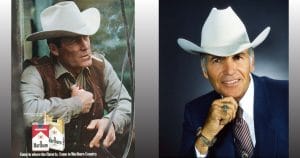Born in Chicago to a family of financiers and lawyers, Norris had something else in mind. His uncle was a rancher, and Norris learned the ropes from him. By age 26, Norris bought the “T-Cross” brand mark, and that was the first cattle brand registered in the state of Colorado. Within a few years he owned 20,000 acres of ranch land near Colorado Springs. Over the years he was able to buy up neighboring properties, bringing the ranch to 63,000 acres, and tens of thousands more in other parts of the county.
In 1954, Phillip Morris wanted to reposition one of its cigarette brands. Marlboro was originally launched as a “woman’s cigarette,” and the company decided to market it as a filtered smoke for men. They decided ads featuring rugged men would help establish Marlboro as manly. The first type of rugged men they settled on: cowboys. The series was such a hit they scrapped the rest of the rugged men (sea captains, weightlifters, war correspondents, construction workers, and more) to concentrate the “Marlboro Man” campaign on cowboys. The early models cast for the role were actors who weren’t convincing as cowboys, so the Leo Burnett ad agency decided to find the real thing. One of the agency execs spotted a photo of Norris with a friend — actor John Wayne — and thought he not only looked perfect, he was a real cowboy. They decided to go to the ranch in person to pitch him. “They walked out of their car, these guys in their pinstripe suits,” remembers his son, Bobby Norris, “and they walked up to Dad and they said,’’How would you like to be in commercials for Marlboro cigarettes?’ He said, ‘Well, I’m kind of busy right now. Why don’t you come back next week, and, if you’re serious, we’ll talk.’ They came back the next week.”

In Norris’s first photo session, they took more than 2,000 photos of him — and that was in the film days. While he was willing to light up cigarettes for the photos, he wasn’t willing to smoke them: he wasn’t a smoker, and he never would be. “He always told us kids, ‘I don’t ever want to see you smoking.” As his children got older, they began to see a conflict over his side job, which he had been doing for 12 years. “One of us finally asked, ‘If you don’t want us smoking, why are you doing cigarette commercials?’ He called up Phillip Morris and quit that day.” The reminder had woken Norris up: “There’s no gray area between right and wrong,” he said. “You do the right thing even if it costs you. You do the right thing.” He turned his off-work attentions to philanthropic causes. Meanwhile, several others who played the “Marlboro Man” who did smoke died from smoking-related diseases, and even with tobacco commercials banned in the U.S. (President Richard Nixon signed the law in 1970), and the decline in print media, “Marlboro Man” advertisements are still being made, mostly for foreign consumption, and the “woman’s cigarette” is still the leading brand of cigarette in the world. Norris never retired from his primary occupation: while he gave up riding horseback in 2017, he continued to direct ranch operations. He developed dementia, and Robert “Bob” Norris died in a Colorado Springs hospice on November 3. He was 90.
